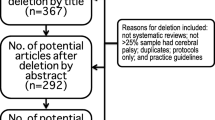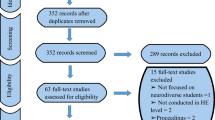Abstract
The results of four follow-up studies of learning-disabled children are reviewed. A comparison of results among the studies and of analyses of individual variation within the studies suggest some factors associated with long-term outcomes. It is argued that in many cases learning disabilities are not a lifelong handicapping condition, especially if adequate treatment is provided during childhood.
Similar content being viewed by others
References
Balow, B. J. and Blomquist, M. 1965. Young adults 10-15 years after a severe reading disability.Elementary School Journal 66:44–48.
Bruck, M. 1985. The adult functioning of children with specific learning disabilities: A follow-up study.In I. Siegel (ed.).Advances in Applied Developmental Psychology. New Jersey: Ablex.
Bruck, M. 1986. Social and emotional adjustments of learning disabled children: A review of the issues.In S. Ceci (ed.).Handbook of Cognitive, Social and Neuropsychological Aspects of Learning Disabilities. Vol. 1 Hillsdale, N.J.: Erlbaum.
Ceci, S. 1986.Handbook of Cognitive, Social and Neuropsychological Aspects of Learning Disabilities. Hillsdale, N.J.: Erlbaum.
Childs, B., Finucci, J. M., Pulver, A. E., and Tielsch, J. 1982. The natural history of specific reading disability. Educational outcomes. Unpublished manuscript. Department of Pediatrics, Johns Hopkins University.
Donahue, M., and Bryan, T. 1984. Communicative skills and peer relations of learning disabled adolescents.Topics in Language Disorders 1:10–21.
Finucci, J., Gottfredson, L. S., and Childs, B. 1985. A follow-up study of dyslexic boys.Annals of Dyslexia 35:117–136.
Frauenheim, J. G., and Heckerl, J. R. 1983. A longitudinal study of psychological and achievement test performance in severe dyslexic adults.Journal of Learning Disabilities 16:339–347.
Gottfredson, L. S., Finucci, J. M., and Childs, B. 1984. Explaining the adult careers of dyslexic boys. Variations in critical skills for high level jobs.Journal of Vocational Behavior 24:355–373.
Herjanic, B., and Penick, E. 1972. Adult outcomes of disabled child readers.Journal of Special Education 6:397–410.
Mauser, A. J. 1974. Learning disabilities and delinquent youth.Academic Therapy 9:389–402.
Muehl, S., and Forell, E. 1974. A follow-up study of disabled readers: Variables related to high school reading performance.Reading Research Quarterly 9:110–123.
Peter, B. M., and Spreen, O. 1979. Behavior rating and personal adjustment scales of neurologically and learning handicapped children during adolescence and early adulthood: Results of a follow-up study.Journal of Clinical Neuropsychology 1:75–92.
Perlmutter, B. F., and Bryan, J. 1984. First impressions, ingratiation, and the learning disabled child.Journal of Learning Disabilities 17:156–161.
Preston, R. C., and Yarrington, D. J. 1967. Status of 50 retarded readers eight years after reading clinic diagnosis.Journal of Reading 11:122–129.
Rawson, M. 1968.Developmental Language Disability. Baltimore: Johns Hopkins Press.
Robinson, H. M., and Smith, H. 1962. Reading clinic clients—ten years after.Elementary School Journal 63:22–27.
Schenck, B. J., Fitzsimmons, J., Bullard, P. C., Taylor, H. G., and Satz, P. 1980. A prevention model for children at risk for reading failure.In R. Knights and D. J. Bakker (eds.).Treatment of Hyperactive and Learning Disordered Children. Baltimore: University Park Press.
Schonhaut, S. and Satz, P. 1984. Prognosis of the learning disabled child: A review of follow-up studies.In M. Rutter (ed.).Behavioral Syndromes and Brain Dysfunction in Childhood. New York: Guilford Press.
Spreen, O. 1981. The relationship between learning disability, neurological impairment and delinquency: Results of a follow-up study.Journal of Nervous and Mental Diseases 169:791–802.
Spreen, O. 1982. Adult outcomes of reading disorders.In R. N. Malatesha and P. G. Aaron (eds.).Reading Disorders, Varieties and Treatments. New York: Academic Press.
Spreen, O. 1984. A prognostic view from middle childhood.In M. Levine and P. Satz (eds.).Middle Childhood: Developmental variations and dysfunction. New York: Academic Press.
Author information
Authors and Affiliations
Additional information
Preparation of this manuscript was supported by the National Health and Welfare Research and Development Program through a project grant and through a National Health Research Scholar Award to Margaret Bruck.
Rights and permissions
About this article
Cite this article
Bruck, M. The adult outcomes of children with learning disabilities. Annals of Dyslexia 37, 252–263 (1987). https://doi.org/10.1007/BF02648071
Issue Date:
DOI: https://doi.org/10.1007/BF02648071




